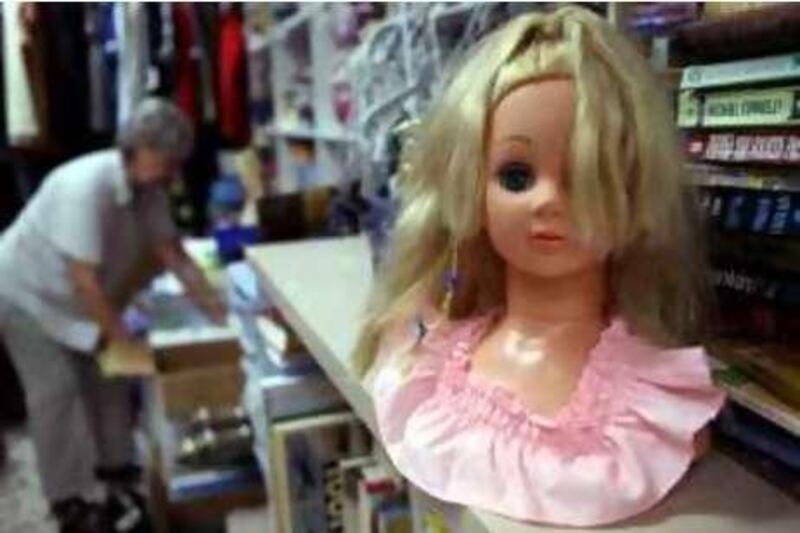The average American discards about 30 kilograms of textiles and clothing per year; the average Briton does about the same. Comparable statistics are unavailable for residents of the Emirates, but one can only guess that the scales would tip even further for us, given the country's wealth, its propensity for shopping binges and its transient population. Which begs the question: where does it all go? What becomes of our unwanted stuff?
Some of it, anyway, finds its way to Abu Dhabi's lone second-hand shop, the St Andrew's Church Thrift Centre. Situated just off of Airport Road in the block that houses all of Abu Dhabi's Christian churches, the thrift centre occupies a space about the size of a large classroom, plus a smaller, adjoining room that serves as a back office and supply closet. It is open on Sundays and Tuesdays, and has been quietly operating since the mid-1970s.
On the inside, the shop looks like a large and overflowing closet, teeming with a mismatched assortment of off-colour garments and objects. In other words, it looks pretty much like any other thrift shop in the world. This universal resemblance is a mysterious property of second-hand shops. Age and use make everything look similarly faded, and people are remarkably consistent in what they cull from their lives: baby paraphernalia, obsolete technology, outdated fashions and novels by James Michener.
(The Abu Dhabi thrift centre, it should be said, also smells pretty much the same as any thrift store in the world - musty and compressed, the olfactory equivalent of sepia.) A quick scan of the wares one recent morning reveals: a set of plastic cups promoting the 2004 film The Incredibles; a wicker basket full of cassette tapes, many of them home-copied with song titles written in ball-point pen; 20 blue gingham girls' uniforms for a British school, assorted sizes; a set of golf clubs in a beaten up leather bag; and three bathrobes from the Abu Dhabi Hilton, all extra large.
Brenda Saadeh, a warm and meticulous Englishwoman who wears red-framed glasses, leads the shop's volunteers. The store's donations, she says, come mainly from Europeans and Americans, while most of its customers hail from the Levant, North Africa and Asia. This can lead to certain mismatches of supply and demand. "The people who are donating wear trousers," Saadeh explains. "The people who are buying do not."
Because most donations come from western expatriates, the store's inventory roughly tracks their movements, habits and tastes. During the summer months, for instance, everything in the shop bears a 50 per cent markdown to offset a seasonal oversupply. "There are so many donations," Saadeh says. "Everybody's leaving." It's like that every year, she says. Life in the Emirates is a revolving door, and there are mountains of discarded belongings on either side of it.
As all those expatriates cycle back home, their ex-possessions often make a surprisingly quick exit from the Emirates as well. The thrift shop's most faithful clientele, Saadeh says, are guest workers who buy in bulk and then send their purchases home in large shipments: textile remittances. A surprising number of the store's customers are regulars who have come once or twice a week for more than a decade.
Saleem Ahmed, a somewhat sallow and shy 54-year-old accountant from Lahore, has been buying "educational books" and "story books" for his four children for the past 10 or 12 years. The weekly ritual has seen his eldest daughter through to the final year of medical school. "I have, I think, hundreds of books from here," he says, seemingly baffled by his own accumulation. Abdul Bagi and Abbas Mohammad, brothers-in-law from Khartoum who are also regular customers, are browsing through the Thrift Centre's neckties. After flipping one tie around to read its label, Mohammad gives his in-law a happy nudge. Christian Dior, it says.
Bagi explains that he too sends most of his purchases back to family in Khartoum. Second-hand clothes there are plentiful, he says, but competition for them is fierce. "Here," he says, "you have time to choose." A Muslim, Bagi professes the highest regard for the largely Christian church volunteers who staff the store. "We are very proud to see these women," he gushes. "Al-hamdalillah, these are wonderful women!"
The shop's 20 volunteers - all women - hail from England, Scotland, Wales, the US, Sweden, Lebanon and Japan. And their work isn't all sorting, stocking and handling the register. "One guy came in - Egyptian, he was - and he was going off to Egypt get engaged," says Saadeh, standing over a black rubbish bag full of donations. "One of our ladies at the time, Elsa, was his personal shopper for the morning. She took him to the suits, she took him to the shirts, the socks, everything - shoes as well. And as there were no ties out there that she liked, we went through the bag that we reserve for Christmas and found him four ties." (The shop saves its nicer donations for an annual winter fair.)
The Egyptian suitor eventually walked out with a green suit, a crisp dress shirt and brown leather shoes. He bought all of it for a few dirhams but, Saadeh says, "he left here looking like a million dollars".





